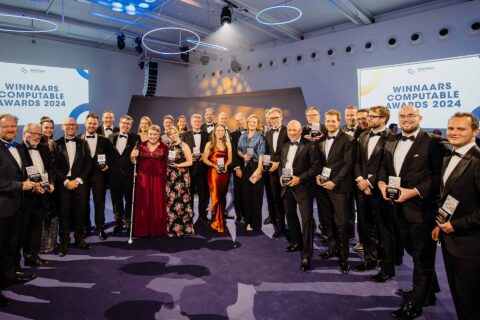For AI to have social value, cooperation between organizations, companies and knowledge parties is crucial. "That's why in Utrecht we have organized all the knowledge and experience in one central location," said Carl Moons, clinical epidemiologist and research director of the Julius Center, during the recent Utrecht AI Event. "And that is certainly not the case everywhere."
Within the walls of Utrecht University and UMC Utrecht, the integrated approach has taken shape in fifteen so-called AI Labs. Each of these labs deals with a specific topic, ranging from police tasks, mobility and animal welfare to sustainability and healthcare. What connects them is a cross-domain working method that is specifically focused on practical applications.
There is a clear rationale behind this approach, according to Moons. "Whether you're working on facial recognition, fraud detection, energy efficiency, rail infrastructure or medical imaging, it's ultimately about the same kind of algorithms," Moons said during the well-attended "Beyond Technology" event at Muziekcentrum Tivoli Vredenburg.
Challenges
That five of the 10 labs focus on health care is no coincidence, according to Moons. The sector has major challenges that are crying out for a new approach. Consider growing demand, an aging population, staff shortages and cost increases. "Pumping more drugs into the system is not the solution," Moons said. "We have to do something different. Technology is part of the solution. We specifically chose the five healthcare labs because they answer the industry's challenges."
Encouraging Serendipity
The hubs are also important in another way, argues Jeroen de Ridder, researcher and associate professor at UMC Utrecht's Center for Molecular Medicine. "To find solutions, it is important that the right people from research and practice find each other. That way, researchers can focus on the problems that really matter. So not just develop another model, but add value and make a difference for the patient. When you look around a hospital, the important questions present themselves. You don't solve them by forcing people in that direction, but by giving space to serendipity. That's what the hubs do."
AI strategy
In order to bring data infrastructure, Research & Development and implementation closer together, UMC Utrecht has developed its own strategy under the name 3AI. According to Moons, this course is right up the healthcare industry's alley. "To develop AI, first of all we need data. Then you can start testing and evaluating the technology. After that comes implementation. Data, research and application; actually, healthcare has been organized on the basis of those three pillars for decades."
Data availability
Still, there are plenty of challenges in healthcare. They start as early as gathering the raw material for AI models, or data. "Data in healthcare is very fragmented," states Miriam Sturkenboom, department head of data science at the Julius Center. "All the different providers do have pieces of information about the patient's journey. With Health Data Space Utrecht, we are trying to build a data infrastructure for safely finding and connecting data so that research can be done and applications can be built. To this end, we are trying to connect and help all healthcare providers in the region in the process of digitization."
Scaling up
In addition to data availability, scaling up is also a recurring problem. "Scaling up is our goal," states Ilse Kant, lead 'AI for Health' at UMC Utrecht. "That means we look for solutions that fit within the broader framework of healthcare. A great example is the development of our algorithm for predicting no shows. So we don't want to keep solutions to ourselves, but to scale up we need partners, both among hospitals and private parties."
Clearing hurdles
Such collaborations can be tricky in a field where much is not yet crystallized, bioinformatician De Ridder argues. "Our algorithms are basically open source, so anyone can use them. But we can't do request numbers. We don't have the capacity for that. Moreover, the question is whether patients are allowed to do all that. Lack of clarity about permission for reuse is one of the biggest hurdles in my view. I don't know in what form, but a lot of expertise needs to come together to clear such hurdles."
Opt out
Why not involve the patient directly, a listener from the audience wants to know. This is already happening thanks to the introduction of the European Health Data Space (EHDS), Sturkenboom responds. "Many citizens were heard in the design of the EHDS. Partly because of that, there has been an opt-out. We also try to engage directly with citizens at the regional level. In general, you can say that people are quite willing to share their data, but under certain conditions. Their data should not be used for commercial purposes and should be in the hands of a trusted party. That's the social permission we have. We are trying to embed that in the Data Space Utrecht."
Venture Capital
To bring the investor perspective into the limelight, the AI Event Utrecht allowed venture investor Eva de Mol to speak. De Mol made a name for herself as founder of investment fund CapitalT, but even more so as an advocate of diversity in the world of big money. In business terms, healthcare is still virgin territory for De Mol, but the sector is certainly not new. "Both of my parents worked in the medical field," De Mol said. "So I was raised with the idea that things should be evidence-based. Right now we don't have any investments in digital care, but we are looking at quite a few companies."
Diversity
What is regularly lacking in start-ups in the Netherlands is the courage to take risks. The absolute will to grow is also sometimes lacking. But on one point the sector has a slight edge. "Great to see how many people with such different backgrounds are here together. Healthcare and education really have more diversity than big tech and finance. That's important, because ultimately investing is not -as is often thought- about money, but about people."













